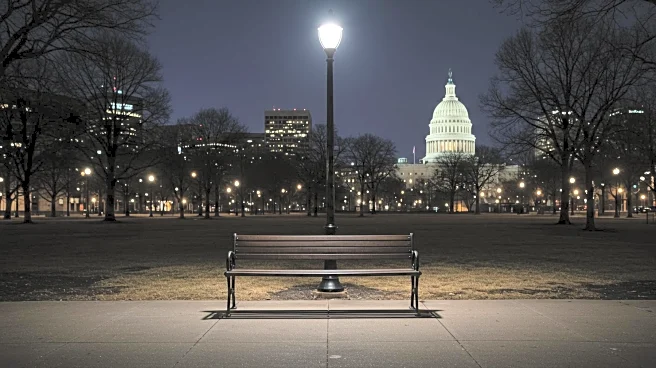What's Happening?
President Trump has initiated a federal takeover of Washington D.C.'s police, deploying National Guard soldiers and federal law enforcement to target violent criminals. This action also affects vulnerable groups, including the homeless population. According to White House press secretary Karoline Leavitt, homeless individuals will be given options to leave their encampments, move to shelters, or receive addiction and mental health services. Those who refuse may face fines or jail time. Dr. Catherine Crosland, a specialist in street medicine, highlights the challenges faced by the homeless, noting that encampment sweeps often result in the loss of vital belongings and documents. Despite the federal crackdown, Crosland emphasizes that many homeless individuals are victims rather than perpetrators of crime.
Why It's Important?
The federal crackdown on homelessness in D.C. underscores the complex intersection of public safety and social welfare. While intended to reduce crime, the initiative risks further marginalizing the homeless, who are often victims of violence themselves. The policy could lead to increased criminalization of homelessness, exacerbating the challenges faced by this vulnerable group. The broader impact on public policy includes potential shifts in how homelessness is addressed, with implications for social services and housing initiatives. Stakeholders such as social workers, healthcare providers, and advocacy groups may need to adapt their strategies to support affected individuals.
What's Next?
The federal initiative may lead to increased scrutiny and debate over the treatment of homeless populations in urban areas. Advocacy groups and local government officials might challenge the approach, calling for more humane and effective solutions. The policy could prompt discussions on the allocation of resources for housing and mental health services. As the situation unfolds, stakeholders will likely monitor the impact on crime rates and the well-being of the homeless community, potentially influencing future policy decisions.
Beyond the Headlines
The federal crackdown raises ethical questions about the balance between public safety and human rights. The approach may contribute to stigmatization of the homeless, affecting public perception and policy. Long-term implications could include shifts in urban planning and social services, as cities grapple with the challenges of homelessness. The initiative highlights the need for comprehensive strategies that address the root causes of homelessness, such as affordable housing and healthcare access.









